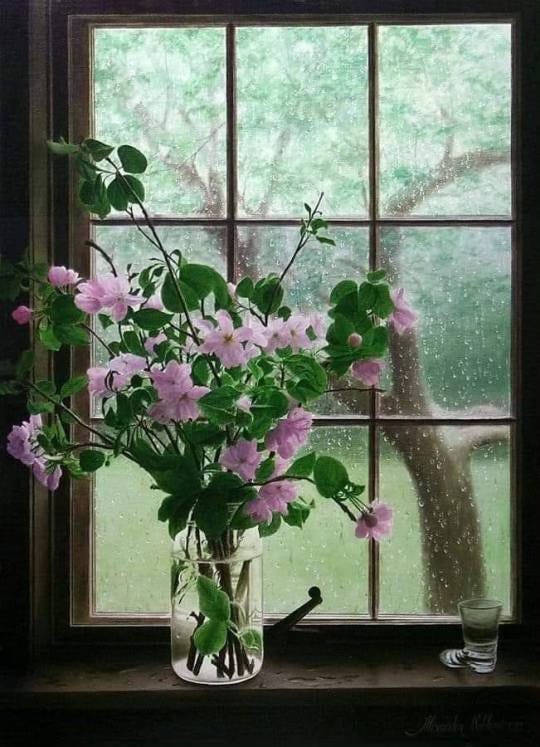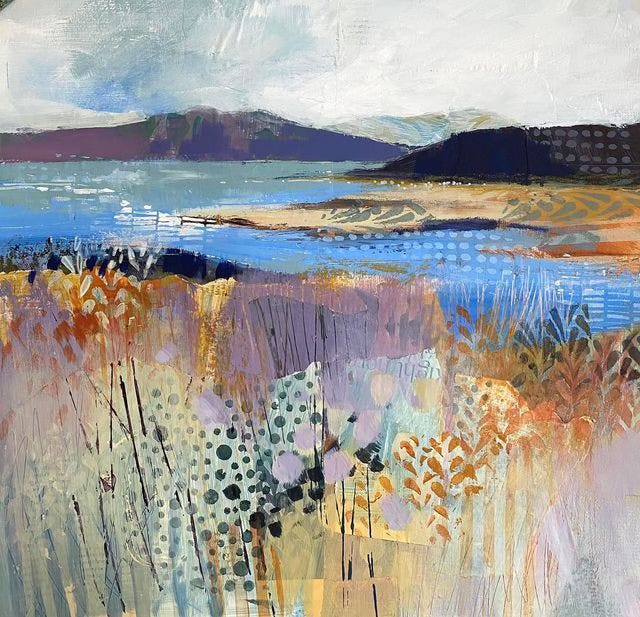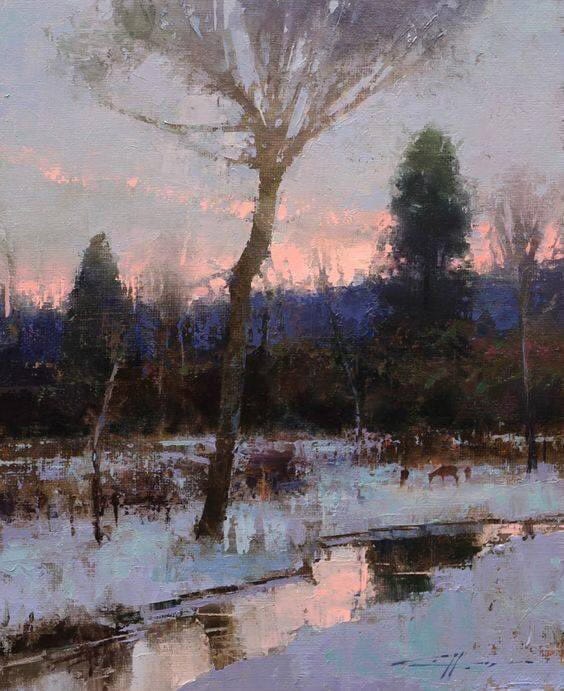Incantation
I'd love to know what you think

Dear You,
Not long ago, I sent you a Kindred Letter containing “You can stop worrying now,” a prose-poem by the great and tender Czeslaw Milosz, in which he describes a near-death experience, of waking up in the middle of the night, filled with happiness; it was as if, Milosz writes, “a voice were repeating: ‘You can stop worrying now; everything happened just as it had to…”
Our Quiet Life members had so many fascinating thoughts on that poem. Like this, from Michael Cirigliano II, who describes a similar and equally extraordinary experience:
About a year into my freelance career as an orchestral clarinetist, I started feeling tightness, and sometimes numbness, in my right hand. After the end of a two-hour rehearsal, I would barely have any strength in my pinkie to depress the four keys that digit was responsible for. I was petrified to let any of my colleagues know (there's no quicker way to losing work than for contractors to hear you're having problems with your playing) and didn't have the health insurance or money to see a doctor.
So for a year, I dealt with the fear of losing everything I had worked for in my 12 years of studying the clarinet. I just showed up at rehearsals and concerts and prayed I wouldn't be exposed. Then one night — which also happened to be my 24th birthday — I sat down to listen to Benjamin Britten's War Requiem and began sobbing during the final movement. I felt emotions I had never felt before, as the music cradled and consoled me. The vibrations moving through my body were calling me to release my fear, and give into whatever plan the universe had for me should it not involve playing music.
The next day I took out my clarinets and for the first time in over a year, I played without any tightness, numbness, or fear. I couldn't believe it, so I just kept playing. For hours, the music flowed from me with an incredible sense of freedom, and I felt a newfound joy blossoming within. For the next nine years, until I packed up my clarinets and transitioned into editorial work, I never once again had any strength or dexterity issues in my right hand.
Ever since, I've felt guided and protected by the universe. The trust and gratitude that experience cultivated within me has been a guiding force ever since.
*
and this, from Margy Houtz :
I’ve experienced this many times…I became aware of it in my early 30’s. What a gift! I’m 84 now, and I try to live with my heart and mind open to the marvelous things around me. I am led by Wendell Berry’s poem, The Peace of Wild Things.
*
and many others, like Karen Theis, who haven’t had such experiences but were nonetheless keen to hear of them:
No I haven't experienced anything like this. But the poetry is so calming and beneficial, that I feel like it is talking to me!

And many of you asked to read more Milosz.
So, here you go - one of my favorites - with a big question from me, at the end. (Please do leave a comment when you get there, and let me know what you think.)
Incantation
Human reason is beautiful and invincible.
No bars, no barbed wire, no pulping of books,
No sentence of banishment can prevail against it.
It establishes the universal ideas in language,
And guides our hand so we write Truth and Justice
With capital letters, lie and oppression with small.
It puts what should be above things as they are,
It is an enemy of despair and a friend of hope.
It does not know Jew from Greek or slave from master,
Giving us the estate of the world to manage.
It saves austere and transparent phrases
From the filthy discord of tortured words.
It says that everything is new under the sun,
Opens the congealed fist of the past.
Beautiful and very young are Philo‑Sophia
And poetry, her ally in the service of the good.
As late as yesterday Nature celebrated their birth,
The news was brought to the mountains by a unicorn and an echo,
Their friendship will be glorious, their time has no limit,
Their enemies have delivered themselves to destruction.
-Czeslaw Milosz, 1968 (translated by Milosz and by Robert Pinsky)

There seems to be a great divide, in the world of poetry readers, over how to interpret this poem.
Is it a statement of optimism - a belief that human reason really is “beautiful and invincible,” and will ultimately triumph over barbed wire and book-pulping?
Or is it a statement of quiet despair - the news of goodness “brought to the mountains by a unicorn and an echo” - i.e. by ethereal figments of our imaginations, by visions that will never come to pass?
Or is it (as the “Incantation” title suggests) simply a prayer?
*
What do you think?
And does this poem relate to any experiences in your own life, or your own experience of history?
Please do let us know, by leaving a comment below.
And, if you enjoyed this Kindred Letter, please consider sharing/subscribing!
P.S. If you’re a bittersweet type of person who loves Czeslaw Milosz, or you’re in a season of sorrows and/or joys, you might enjoy my Bittersweet Practices and Reflections audio course. It involves 30 days of exploration, through audio lessons, guided meditations, and reflections on art and music, delivered straight to your phone; and it’s curated and designed to help you tap into the transformative power of bittersweetness.



LOVE the community comments you’ve shared here!
And on the Incantation, it makes me think of a book I love, written by Hemingway. I’m not really a Hemingway fan, but he wrote one book that is in the top tier of my favorite books of all. I think it is possible that there is a book, or perhaps a piece of music that is the piece of all pieces that the author was meant to write, like for John Williams the Theme to Schindler’s List. For Hemingway it is “The Old Man and the Sea”
Filled with the humanity of self talk the old fisherman confronts the elements and his age, and the fading of his strength. How more human can we be than this inner voice that speaks.
I have an inner voice. I call this aspect of inward reason and reflection, “The little man who lives in my head”. Most of the time he sleeps, but he awakens in times of trouble, confusion, or despair. “He” is that part of me that is a total emulsion of self compassion and self criticism, inseparable. He raises question that I had not thought of, and patiently waits for my answer, then leads me on to his next question, until at the end, I’ve learned something. The key ingredient is compassion, and because it is there, I feel he is lifting my feet back on the correct pathway, and is never bothered by how obtuse I can be. Anyway, I love this book by Hemingway, and I love those troubled moments when my own form of self talk awakens.
Hi there, when I first read the poem, especially the beginning, I felt a whole lot of fear. I think I have tortured myself with reason... that it is that that has fuelled a lot of the shame and worry that have dominated my life. Reason itself has felt like a cage condemning me. As I read through the rest though, especially the mention of poetry as an ally, and learning about Philos-Sophia and Wolfgang Smith, it brought to me the thought that perhaps it isn't reason that has been the difficulty, but instead the doctrine mine has followed and the lack of art and heart. I do think reason without heart, curiosity and imagination often is a loveless, lifeless prison, that misses the beauty and wonder that is present in our world, each other, reality - especially the bittersweet kind... and that reason can be hijacked. But I now also see how as an ally with curiosity, heart and imagination, it has an important role to play, as we humans navigate the world. Especially its' ability to remain neutral... approach everything as new, rather than tainted by all the baggage which can obscure the present moment.